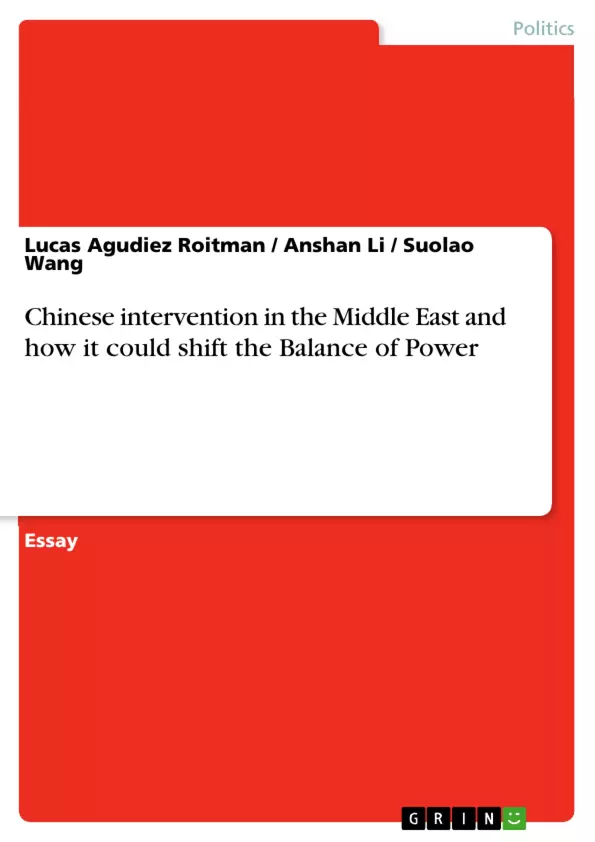In this paper, we analyze how China, as a rising world power, increases its authority for economic sanctions in the Middle East and how that affects the current negotiations between the United States, Arab countries and Israel.
We will look into the deals and consensus that have been achieved between western countries and Middle Eastern ones, and what the interests for the United States are in order for it to invest its resources in foreign intervention in that area. At the same time, we will attempt to see how China is starting to intervene and what incentives China has for intervention or lack thereof, and how those incentives differ from the western incentives.
Finally, we will look into how important issues such as nuclear terrorism, oil production and price-fixing, Zionism and Islamic states can be influenced by Chinese-USA competition for natural resources and political support, which problems are being worsened and which ones are being solved by the rise of China as an economic and political partner for Middle Eastern countries.
Inhaltsverzeichnis (Table of Contents)
- Abstract
- Keywords
- Introduction
- OPEC
- An Islamic State
- Democracy for all
- China is not a Democracy
- Israel
- How China is intervening
- Conclusion and Discussion
Zielsetzung und Themenschwerpunkte (Objectives and Key Themes)
This paper examines China's rising influence in the Middle East and its implications for the balance of power in the region. The authors explore how China's increased involvement in the region affects existing negotiations between the United States, Arab countries, and Israel.
- China's growing economic and political influence in the Middle East
- The dynamics of competition between China and the United States in the region
- The impact of Chinese intervention on the geopolitical landscape of the Middle East
- The role of oil, natural resources, and strategic alliances in shaping Chinese policy
- The potential implications of Chinese involvement for regional stability and security
Zusammenfassung der Kapitel (Chapter Summaries)
- Introduction: This chapter introduces the topic of Chinese intervention in the Middle East, highlighting the historical context of US involvement in the region and the US's strategic interests in maintaining a divided Arab world. It discusses the US's policy of supporting rebel groups to prevent the emergence of a unified and powerful state in the region.
- OPEC: This chapter explores the formation and purpose of the Organization of the Petroleum Exporting Countries (OPEC), emphasizing its role in countering the price-fixing practices of multinational oil corporations. The authors highlight how OPEC has allowed oil-exporting nations to gain more control over their natural resources and influence global oil prices.
Schlüsselwörter (Keywords)
The key terms and concepts explored in this work include China, Middle East, United States, foreign intervention, economic policy, nuclear terrorism, Zionism, Islamic states, OPEC, democracy, nationalism, and natural resources. This paper delves into the intricate web of geopolitical interactions, economic strategies, and cultural tensions that characterize the contemporary Middle East.
Frequently Asked Questions
How is China intervening in the Middle East?
China is increasing its economic influence through trade deals, infrastructure investments, and as a political partner, often presenting an alternative to Western models.
What is the role of OPEC in this context?
OPEC allows oil-exporting nations to control their resources and influence global prices, which is a key factor in the competition for natural resources between China and the USA.
How does Chinese intervention affect US policy?
It shifts the balance of power and challenges US strategic interests, particularly regarding regional alliances and control over energy resources.
What are the main incentives for China in the region?
China's primary incentives include securing energy supplies (oil), expanding its economic footprint, and increasing its global political authority.
Does China promote democracy in the Middle East?
No, as a non-democracy itself, China's intervention model does not typically prioritize the promotion of democratic values, unlike traditional Western foreign policy.
- Arbeit zitieren
- Lucas Agudiez Roitman (Autor:in), Anshan Li (Co-Autor:in), Suolao Wang (Co-Autor:in), 2014, Chinese intervention in the Middle East and how it could shift the Balance of Power, München, GRIN Verlag, https://www.grin.com/document/354908



